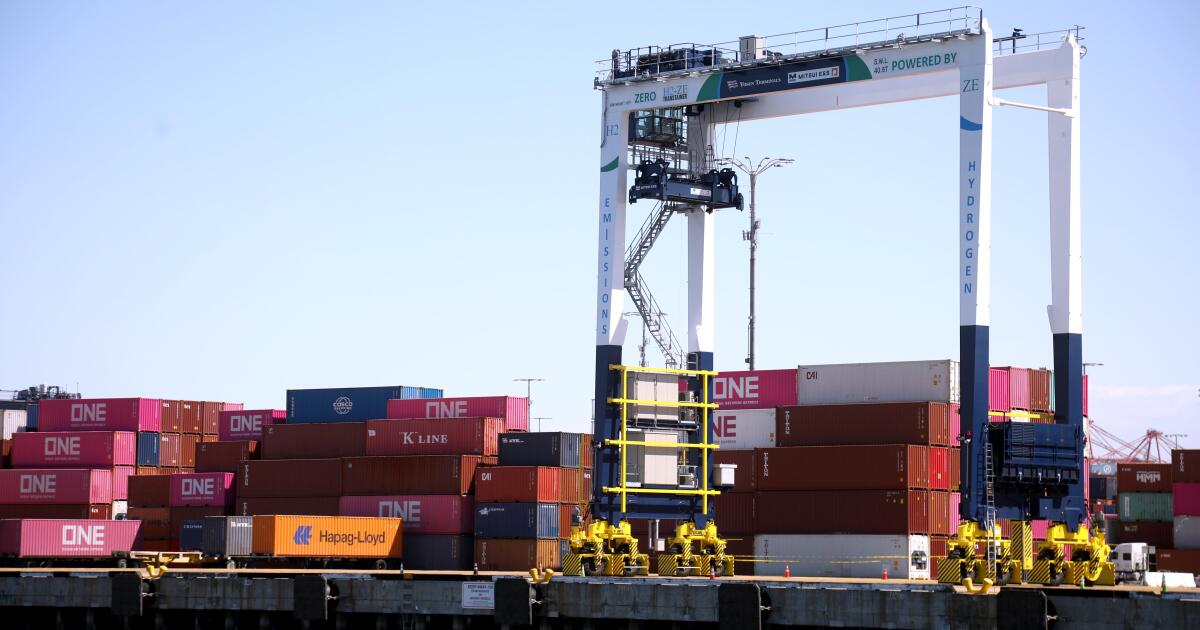The Trump administration’s efforts to dismantle environmental protections and roll back nationwide progress toward clean energy disproportionately target California and other blue states, internal documents show.
As early as this week, the Department of Energy may pull funding from hundreds of projects — many of which were bolstered by President Biden’s bipartisan infrastructure law and are geared toward climate-friendly initiatives such as solar power, heat pumps, battery storage and renewable fuels, according to a leaked list reviewed by The Times.
The cuts could include as many as 262 projects in the DOE’s Office of Energy Efficiency and Renewable Energy, of which roughly 80% are based in states that did not go for Trump in the 2024 presidential election.
Also on the chopping block are nearly two dozen projects in the Office of Clean Energy Demonstrations, including a major national effort known as the Regional Clean Hydrogen Hubs (H2Hubs) Program, which aims to accelerate the development of hydrogen projects that can replace planet-warming fossil fuels.
Those cuts, too, are not applied equally: Of the seven states and regions selected to participate in the $7-billion federal hydrogen project, the four set to be gutted are in primarily Democratic areas.
The hydrogen incubators on the cut list include a hub in California; a Mid-Atlantic hub in Pennsylvania, Delaware and New Jersey; a Pacific Northwest hub in Oregon, Washington and Montana; and a Midwest hub in Illinois, Indiana and Michigan.
Meanwhile, the hydrogen hubs in red states and regions are safe, the list shows, including a large hub in Texas; a “heartland” hub in Minnesota, North Dakota and South Dakota; and an Appalachia hub in Ohio, West Virginia and Pennsylvania.
Officials with the Department of Energy said Tuesday that the agency is conducting a department-wide review and warned that there are “fake lists” floating around.
“The review is ongoing, and speculation by anonymous sources about the results of the review are just that — speculation,” agency spokesman Ben Dietderich said in a statement.
California was among 33 applicants for the competitive initiative, which launched in 2021 and ultimately selected seven “hubs” to develop and test various sources of hydrogen.
The California hub — known as ARCHES, or the Alliance for Renewable Clean Hydrogen Energy Systems — was awarded $1.2 billion in federal funds, with plans to bring in an additional $11.2 billion from private investors.
But it now faces cuts from Trump’s DOE despite the fact that the hub was the highest-scoring applicant among those considered for the federal award, according to sources familiar with the matter.
Democratic staff members with the House Science Committee who agreed to speak on background said the findings indicate that the cuts are partisan and ideological in nature — a trend in keeping with other actions from the Trump administration, which has repeatedly targeted environmental programs in California and other Democratic areas in recent weeks.
Indeed, cost alone does not appear to be a factor, given that Texas’s hydrogen hub received the same amount of federal funding — $1.2 billion — as California’s, yet the former was not on the cut list. The two states’ projects were the costliest of the hubs, which range from roughly $750 million to $1.2 billion.
The total cuts from the DOE’s Office of Energy Efficiency and Renewable Energy amount to more than $905 million, with about $735 million coming from blue states and $169 million from red states, according to a Times analysis.
Insiders said the proportions do not reflect overall clean energy investments by red and blue states, with Republican states such as Texas — a clean energy juggernaut — facing far fewer cuts from that office. According to documents reviewed by The Times, only eight Texas projects are on the chopping block compared with 53 in California.
House Science Committee staffers cautioned that the leaked lists represent a snapshot in time and that the administration could change its plans before making any official announcements.
Already, they said, some Republican representatives and private industry leaders have been successful in stopping certain projects from being canceled. So far, none of their Democratic counterparts have been able to do the same, they said.
The cuts could have considerable implications for the nation’s energy future.
The seven hydrogen hubs were collectively expected to produce 3 million metric tons of hydrogen each year — reducing 25 million metric tons of carbon dioxide emissions, or roughly the amount of 5.5 million gas-powered cars.
Each of the seven hubs was experimenting with different sources of hydrogen, with California focused on producing hydrogen exclusively from renewable energy and biomass while other hubs worked with natural gas, nuclear power and renewable sources such as wind and solar.
Officials with ARCHES said it could be weeks before they have more clarity on the situation.
“ARCHES remains committed to working with our partners to establish a secure, reliable and competitive hydrogen ecosystem, creating hundreds of thousands of good-paying jobs and delivering substantial health and economic benefits for Californians,” Chief Executive Angelina Galiteva said in a statement. “We have nothing more to share at this time.”
Hydrogen is also not without controversy. Critics have expressed concern that producing hydrogen is water- and energy-intensive, potentially dangerous to transport and expensive.
Supporters say it fills in a key gap that electrification alone cannot cover, particularly for heavy industries such as manufacturing and transportation.
ARCHES planned to fund at least 37 smaller projects in and around California, including efforts to decarbonize the Port of Los Angeles, as well as plans to install more than 60 hydrogen fueling stations around the state.
The status of those projects remains unclear.
The president — who received record donations from fossil fuel companies during his campaign — has taken aim at what he describes as “environmental extremists, lunatics, radicals and thugs” in recent weeks, vowing instead to ramp up the production of coal, increase oil drilling and block California’s efforts to transition to electric vehicles, among other actions.

